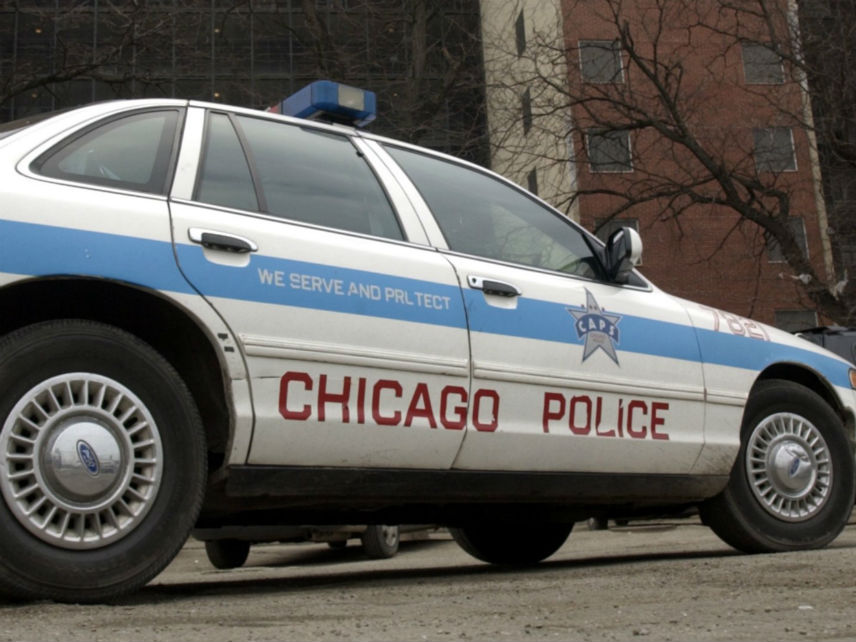Did This Chicago Teen Commit Suicide or Was He Shot by Police?
The family of 15-year-old Steven Rosenthal is demanding proof after he died in a police chase.

Steven Rosenthal, a 15-year-old Chicago teen, died at the end of a police chase this past weekend. The Chicago Police Department (CPD) says that Rosenthal committed suicide; his family believes he died at the hands of the cops.
The encounter began on Friday evening. Some officers decided to question Rosenthal after spotting him with a weapon. Rosenthal fled, and the officers pursued on foot. He ran all the way back to his home, where he later died on the back stairwell from a gunshot wound to the head. CPD spokesperson Anthony Guglielmi tweeted that Rosenthal had "tragically used the weapon on himself."
The Cook County Medical Examiner ruled Rosenthal's death a suicide, based on unspecified evidence found in an autopsy. Guglielmi also said that video and ballistics evidence showed that the CPD did not fire on Rosenthal. Though there is body camera footage from the incident, ABC 7 reports that the department will not release it until it can be sure that it does not hinder the police investigation.
Rosenthal's family rejects the CPD's story, arguing that the shooting was not only out of character but did not match witness statements. They are now demanding an investigation into the cops' claims. Following the shooting, Terinica Thomas, Rosenthal's aunt, said, "I need to see evidence. My nephew would never commit suicide."
"Steven was on the stairwell of his grandmother's house on the West Side of Chicago when police officers stormed up the stairwell chasing," Andrew Stroth, a lawyer representing the family, said at a news conference. Stroth cited "several eyewitness accounts" to back up his version of events, concluding that "these officers, without cause or provocation, shot and killed 15-year-old Steven."
This is not the first time a death has been disputed between police and family. Earlier this year, for example, D.C.'s Metropolitan Police Department and the family of the late Jeffrey Price found themselves at odds over the official explanation for Price's May death. The cops claimed that Price died after his illegal dirt bike crashed into a police SUV. Witnesses and pictures from the scene, however, indicate that an officer—identified as Michael Pearson—caused the crash when he attempted to cut off the dirt bike with his police SUV.
Editor's Note: As of February 29, 2024, commenting privileges on reason.com posts are limited to Reason Plus subscribers. Past commenters are grandfathered in for a temporary period. Subscribe here to preserve your ability to comment. Your Reason Plus subscription also gives you an ad-free version of reason.com, along with full access to the digital edition and archives of Reason magazine. We request that comments be civil and on-topic. We do not moderate or assume any responsibility for comments, which are owned by the readers who post them. Comments do not represent the views of reason.com or Reason Foundation. We reserve the right to delete any comment and ban commenters for any reason at any time. Comments may only be edited within 5 minutes of posting. Report abuses.
Please to post comments


He committed suicide with a cop's plant weapon?
Suicide by cop.
Possible, but I'm inclined to say no in this case. There's no allegation that he brandished a weapon or weapon like object at the police which would be a predicate requirement for suicide by cop.
I don't know why the cops even bother to lie anymore. It's not like they ever face any consequences when the truth comes out.
The alleged crime was being spotted with a weapon. Not battery, burglary, armed robbery, disturbing the peace... nope. Like Harith Augustus and Freddie Gray the officers' x-ray vision detected a weapon, lack of FOID/CCW, and/or that he was a minor.
Montana has an inquest jury in cases like this, that sounds like a good practice for every state.
Plenty of solutions have been offered, ranging from eliminating police unions to eliminating laws that create criminals without victims.
And why would Reason need to offer the other side's perspective? It's not like one needs to look very hard to find it.
Systems need to be reformed.
The DOJ entered consent decrees with forces in Oakland, New Orleans, Baltimore, Ferguson, Chicago, Albuquerque and others because they showed patterns and practices of racism in their forces. These were pervasive and not due to individual officers, but due to the leadership and structure.
This leads to the black community especially having an antagonistic relation with the cops, making their jobs more dangerous and less effective.
Richmond, CA hired a chief who made it his mission to build relations with the overwhelmingly black and Latino community. Police shootings plummeted and the crime, which previously had been among the worst in the country, has turned dramatically.